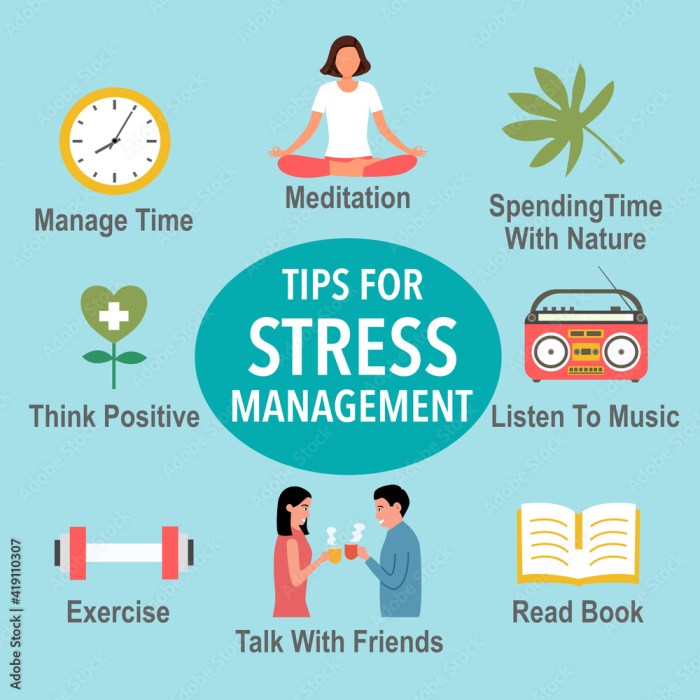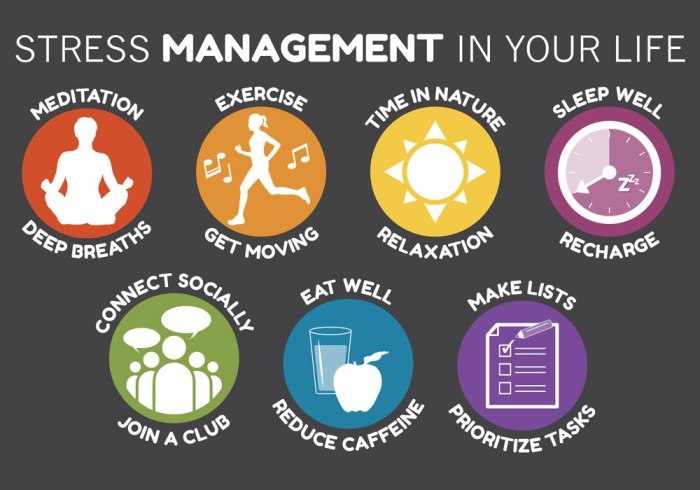Stress Management Tips: Let’s dive into the world of managing stress like a boss, exploring techniques to keep your cool in any situation. From healthy lifestyle changes to relaxation techniques, we’ve got you covered.
Are you ready to take charge of your stress levels and live your best life? Let’s get started!
Overview of Stress Management Tips

Stress management is all about handling those overwhelming feelings that can mess with your mind and body. It’s like taking control and not letting stress rule your world. Learning effective stress management techniques is key to keeping your cool and living your best life. Stress can seriously mess with your mental and physical health, causing all sorts of issues like anxiety, depression, high blood pressure, and even heart disease. So, it’s super important to have some tricks up your sleeve to keep stress at bay.
Healthy Lifestyle Changes
Incorporating healthy lifestyle changes can significantly impact your ability to manage stress effectively. Making small adjustments to your daily routine can help reduce stress levels and improve overall well-being.
Role of Exercise in Stress Reduction
Regular physical activity plays a crucial role in reducing stress. Exercise helps release endorphins, also known as “feel-good” hormones, which can elevate your mood and reduce feelings of anxiety and stress. Additionally, engaging in physical activity can help clear your mind, improve sleep quality, and enhance overall physical health.
Benefits of a Balanced Diet for Managing Stress
Maintaining a balanced diet rich in fruits, vegetables, whole grains, lean proteins, and healthy fats can positively impact your stress levels. Certain nutrients, such as omega-3 fatty acids and antioxidants, have been linked to lower stress levels and improved mental health. Eating a well-rounded diet can provide the necessary nutrients to support your body during times of stress and promote overall well-being.
Tips on Getting Adequate Sleep to Reduce Stress Levels
Adequate sleep is essential for managing stress effectively. Lack of sleep can exacerbate feelings of stress, anxiety, and irritability. To improve your sleep quality and reduce stress levels, establish a bedtime routine, create a comfortable sleep environment, limit caffeine and electronic device use before bedtime, and aim for 7-9 hours of quality sleep each night. Prioritizing rest and relaxation can help you feel more refreshed and better equipped to handle stressors throughout the day.
Relaxation Techniques: Stress Management Tips

In today’s fast-paced world, stress has become a common part of our lives. It is essential to incorporate relaxation techniques into our daily routines to manage stress effectively. Here, we will explore the benefits of mindfulness, meditation, and deep breathing exercises in stress relief, along with tips on how to incorporate these techniques into your daily life.
Mindfulness and Meditation
Mindfulness and meditation are powerful tools for managing stress. By focusing on the present moment and being aware of your thoughts and feelings without judgment, you can reduce stress and increase your sense of well-being. Regular practice of mindfulness and meditation can help calm the mind, improve concentration, and enhance overall mental clarity.
Deep Breathing Exercises
Deep breathing exercises are simple yet effective in reducing stress and promoting relaxation. By taking slow, deep breaths, you can activate the body’s relaxation response, which helps lower blood pressure, reduce heart rate, and alleviate tension in the body. Deep breathing also increases oxygen flow to the brain, promoting a sense of calmness and clarity.
Incorporating Relaxation Techniques into Daily Routines
It’s important to make relaxation techniques a part of your daily routine to effectively manage stress. Here are some tips on how to incorporate mindfulness, meditation, and deep breathing exercises into your daily life:
- Set aside a few minutes each day for mindfulness or meditation practice, whether it’s in the morning before starting your day or in the evening before bed.
- Practice deep breathing exercises whenever you feel stressed or overwhelmed, taking a few moments to focus on your breath and calm your mind.
- Create a relaxing environment at home or work by incorporating elements like soothing music, aromatherapy, or a comfortable space for meditation.
- Join a yoga class or mindfulness group to stay motivated and accountable for incorporating relaxation techniques into your routine.
Time Management Strategies
In today’s fast-paced world, managing your time effectively is crucial to reducing stress levels and maintaining a healthy work-life balance. By implementing practical time management strategies, you can prioritize tasks, set boundaries, and improve productivity.
Prioritize Tasks
- Start by creating a to-do list with all your tasks for the day.
- Identify urgent and important tasks that need immediate attention.
- Break down larger tasks into smaller, more manageable steps.
- Delegate tasks that can be done by others to free up your time.
Setting Boundaries for Work-Life Balance
- Establish specific work hours and stick to them to prevent burnout.
- Avoid checking work emails or messages outside of work hours.
- Create a designated workspace at home to separate work from personal life.
- Schedule regular breaks throughout the day to recharge and avoid overworking.
Effective Time Management Tips, Stress Management Tips
- Use time-blocking techniques to allocate specific time slots for different tasks.
- Avoid multitasking, as it can decrease productivity and increase stress levels.
- Learn to say no to additional tasks that will overwhelm your schedule.
- Utilize technology tools such as calendars and productivity apps to stay organized.
Social Support and Communication
When it comes to managing stress, having a strong social support system and effective communication skills can make a world of difference in how we cope with everyday challenges.
Talking to Friends or Family
One of the simplest yet most effective ways to manage stress is by talking to friends or family members. Sharing your thoughts and feelings with loved ones can provide a sense of relief and comfort, knowing that you are not alone in facing your struggles. Sometimes, just having someone to listen can help you see things from a different perspective and find solutions to your problems.
Seeking Professional Help or Therapy
For more complex or persistent stress issues, seeking professional help or therapy can be incredibly beneficial. Therapists or counselors can offer valuable insights, coping strategies, and tools to help you better manage your stress levels. They can also provide a safe space for you to explore and address underlying issues that may be contributing to your stress.
Improving Communication Skills
Effective communication is key to maintaining healthy relationships and reducing stress. By honing your communication skills, such as active listening, expressing your needs clearly, and resolving conflicts constructively, you can prevent misunderstandings, build trust, and strengthen your connections with others. This can lead to a more supportive and harmonious social environment, which in turn can help you manage stress more effectively.